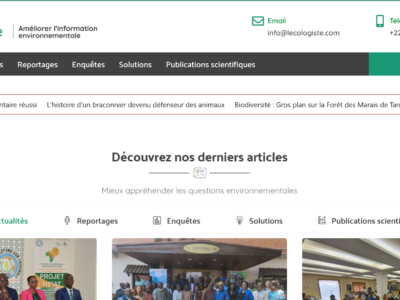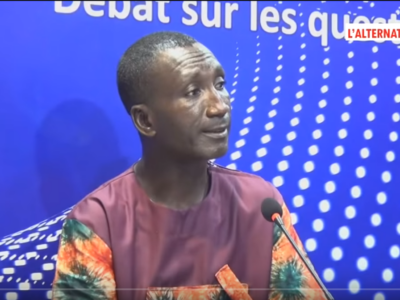Stories about Sub-Saharan Africa from July, 2023
A 1961 Senegalese novel shows the enduring wealth of African literature
Cheikh Hamidou Kane's novels are penetrating explorations of the deep-seated unease within Africa's intellectual class amid French colonization — still relevant today
An interview with Aïssatou Fofana, environmental investigative journalist in Ivory Coast
Aïssatou Fofana, an Ivorian journalist specialising in environmental investigations, talks to Global Voices about her passion but also the dangers of the job, and about her own media platform.
Women’s participation in Nigeria’s politics is moving backward: A call for action
Studies indicate a positive correlation between higher levels of gender equality, women's political participation, and better overall governance, with significantly lower levels of corruption.
Togo finally gives its authors recognition in its school syllabus
As a result of a reform of the literature teaching program in secondary schools, Togolese authors are at last making their entry into the lessons of their country.
Deconstructing the politics behind the mistreatment of migrants from Africa in Tunisia
Tunisia's crackdown on African migrants has become a bargaining tool with Europe, leading to an agreement that allows Europe to control immigration in return for helping with Tunisia's economic crisis.
Prolonged detention of activist draws anger in Angola
Among the grounds for suspending the sentence of Tanaice Neutro was his ill health and the fact that he was a first-time offender — but this court ruling was never enforced.
Burundian women reclaim self-worth thanks to their resilience
A third of all Burundian women suffer physical violence and those who leave home fall into poverty. However, a Burundian businesswoman has subsequently become their role model.
In Togo, a journalist honoured for his fight against corruption must from now on live in exile
In Togo, the journalist Ferdinand Ayité's determination and resilience net him an international prize, but Togolese journalists are still powerless in the face of exile.
Fuel price increase leads to demonstrations and deaths in Angola
Petrol prices rose from 160 kwanzas to 300 kwanzas per litre (from US$0.26 to US$0.49) following the government's announcement of a gradual withdrawal of gasoline subsidies.
How digital media shapes public opinion about environmental sustainability in Nigeria
In a report on media coverage, it was found that fewer than 0.1 percent of articles published by two Nigerian newspapers over two three-month periods addressed climate change.
Burundi’s troubled history of the untold 1972 Hutu genocide
The revelations through the Truth and Reconciliation Commission have brought to light more than 4,700 mass graves, laying bare the profound magnitude of the atrocities that transpired during 1972 in Burundi.
Ibihe: One of the few Burundian news outlets raising climate crisis awareness
Burundian news outlet, Ibihe.org, is one of the country’s few local outlets to report the climate crisis challenges impacting Africa and other regions the world over.
IciCongo: Portrait of a young online channel that wants to ‘Tell the story of Congo differently’
In the DRC, an online outlet stands out by promoting an editorial policy that brings to the fore daily life as really lived by the majority of Congolese.
Khartoum: The city I fled; the city I love
Once yearning to break free from Khartoum, now I long to return, driven by a newfound love for the city, even amidst its recent ruin by armies, crisis-merchants and looters.
North-eastern Niger has become a safe haven for refugees fleeing armed attacks in the Sahel
Less affected by the armed conflicts in the Sahel region, Niger plays role of partner of choice for Westerners expelled from Mali and Burkina Faso.
Kenya draws inspiration from Estonia in its journey toward e-governance
Kenya is a thriving democracy, but its internet penetration rate stands at only 33 percent, posing a crucial question: Is the country prepared to embrace the wave of e-governance?


















